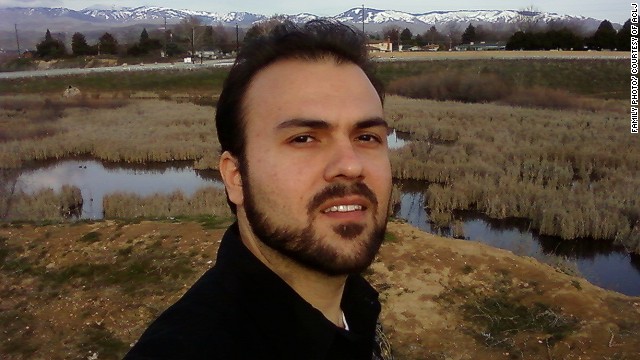Iranian-American pastor Saeed Abedini was arrested and charged in Iran last year while visiting his parents.
Iranian authorities have moved imprisoned American Saeed Abedini to a
more dangerous prison and are now prohibiting visits from the family of
the Christian pastor, according to the public interest law firm
representing Abedini's family in the United States.
Abedini, 33, is an Iranian-born U.S. citizen who makes his home in Boise, Idaho, with his wife and two small children.
He converted to
Christianity from Islam. In the Islamic Republic of Iran, a Muslim who
converts to another faith can face the death penalty. Abedini was
arrested in June 2012 during a visit to his native country.
In a news release, the
American Center for Law and Justice (ACLJ) said that one of Abedini's
Iranian family members went to visit him at Evin Prison in Tehran on
Sunday and was told that Abedini had been moved the previous day to
Rajai Shahr Prison near Karaj. The family member then made the
hour-and-a-half drive to Karaj and was told that Abedini was not
permitted to receive visitors.
he ACLJ pointed out that
the transfer occurred at the same time demonstrators in Iran were
chanting, "Death to America!" in rallies observing the anniversary of
Iranian protestors seizing the U.S. Embassy in Tehran in 1979.
U.S. Secretary of State
John Kerry says Iran has detained Abedini since Sept. 26, 2012,
sentencing him to eight years in prison, "on charges related to his
religious belief." Kerry has called for Iran to release him.
Appearing on CNN's"The
Lead with Jake Tapper," on September 24, near the one year anniversary
of his imprisonment, Abedini's wife, Naghmeah, said, "His charge was
undermining the Iranian government, the basis for the charge was
Christian gatherings."
She said that at the time
of Abedini's arrest, he was in Iran with that government's permission
to build a nonsectarian orphanage on his parent's property. She said
that he had worked with house churches on visits prior to the one during
which he was arrested.
U.S. President Barack Obama also has called for Abedini's release.
On September 27, Obama
spoke by phone with Iranian President Hassan Rouhani when Rouhani was in
the United States for a speech at the United Nations. The call was the
first time presidents from the two nations have spoken directly since
the U.S. severed diplomatic ties with Iran following the Islamic
Revolution and the seizing of hostages at the U.S. Embassy in Tehran.
A senior official in the
administration told CNN that the president "noted our concern about
three American citizens who have been held within Iran -- Robert
Levinson, Saeed Abedini, and Amir Hekmati -- and noted our interest in
seeing those Americans reunited with their families." Levinson, a
retired FBI agent, vanished during a business trip to Iran in March
2007. Amir Hekmati is a former U.S. Marine who was jailed in Iran in
2011, with the Iranian government accusing him of espionage
Fraz Sanei, Iran
researcher with Human Rights Watch, said that "prisoners of conscience"
incarcerated at Rajai Shahr Prison are comingled with violent offenders,
such as those serving time for murder convictions. He also cited
reports of overcrowding, lack of running water, lack of heat in the
winter, and negligence on the part of jailers.
He said prisoners
regularly do not receive needed medical care, and some have staged
hunger strikes in an effort to receive more humane treatment.
Regarding Saeed's case
Sanei said, "Saeed Abedini is among the dozens of Iranian Christians who
have been subjected to surveillance, harassment, arbitrary arrests and
detentions, and unlawful convictions during the past few years because
of the Iranian government's crackdown on Christian converts and the home
church movement.
"Iran's judiciary should
immediately free Abedini and others like him, and allow Iran's
Christian community, and particularly members of the country's besieged
home church movement, to practice their faith free from government
interference."

No comments:
Post a Comment